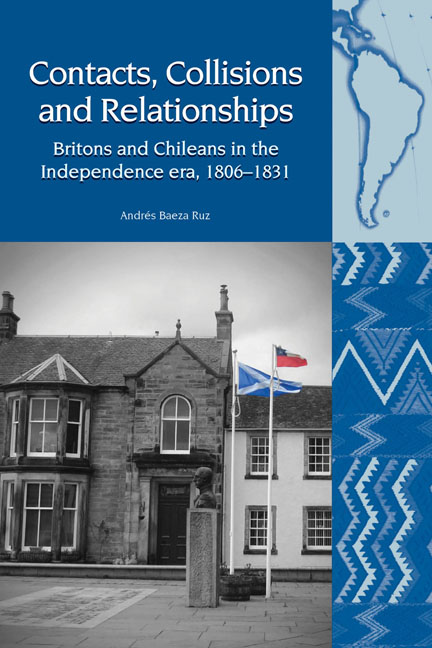Book contents
- Frontmatter
- Contents
- Acknowledgements
- Abbreviations
- Preface
- Introduction
- 1 Invasions, Negotiations and Conspiracies: British-Chilean Relations in an Era of Change, 1806–1817
- 2 Cultural Encounters Offshore: Britons and Chileans in the Chilean Navy, 1817–1823
- 3 Bibles, Schools and Citizens: British Protestant Missionaries and Educators in Chile, 1817–1831
- 4 British Merchants, Private Interests and the Fostering of Free Trade in Chile, 1811–1831
- 5 Beyond Diplomacy: The Cultural Significance of British Recognition of Chile's Independence, 1817–1831
- Conclusion
- Bibliography
- Index
Preface
- Frontmatter
- Contents
- Acknowledgements
- Abbreviations
- Preface
- Introduction
- 1 Invasions, Negotiations and Conspiracies: British-Chilean Relations in an Era of Change, 1806–1817
- 2 Cultural Encounters Offshore: Britons and Chileans in the Chilean Navy, 1817–1823
- 3 Bibles, Schools and Citizens: British Protestant Missionaries and Educators in Chile, 1817–1831
- 4 British Merchants, Private Interests and the Fostering of Free Trade in Chile, 1811–1831
- 5 Beyond Diplomacy: The Cultural Significance of British Recognition of Chile's Independence, 1817–1831
- Conclusion
- Bibliography
- Index
Summary
The streets of London have long been an outpost of Chilean domestic politics. The city has attracted Chilean writers and rebels, artists and atrocity-makers, politicians and tourists for more than two hundred years. In return, British bankers, merchants, miners, farmers and other emigrants have moved to South America in search of new lives there while retaining their own strong cultural and familial links back home. The historic relationship between the two countries, their institutions and their people, is one of the longest-standing international associations in modern times. Chileans of British descent (including Scottish, Welsh and Irish), are estimated to make up approximately 5% of the country's population with surnames like: Aylwin, Blest, Bunster, Cheney, Collingwood, Condell, Cox, Edwards, Hardy, Mackenna, Mackintosh, Miller, Ross, Simpson, Tupper, Walker, Williams and Wood. In the pages that follow, Andres Baeza Ruz expertly outlines the early years of this connection, characterising the experience as one of contact and collision. It is an apt description and one that extends well beyond the foundational period that he studies here.
The distant Chilean land and its people have had a long presence in the British literary public's mind. At the beginning of the seventeenth century, George Carew attempted the first English translation of La Araucana (The Araucaniad), Alonso de Ercilla's epic account of the sixteenth-century conquest. Spanish colonial historians Pedro Cieza de Leon and Alonso de Ovalle wrote chronicles that created the enduring impression of Chile as a fierce, wild and beautiful place. Throughout the eighteenth century, London booksellers stocked these accounts on their shelves, while fashionable magazines regularly excerpted them to be read as erudite after-dinner entertainment. Daniel Defoe literally and figuratively put Chile on the cultural map of British literature when he used one of the Juan Fernandez Islands as the fictional setting for his novel Robinson Crusoe in 1719; this cultural connection remains so powerful that the Chilean government formally renamed it Robinson Crusoe's Island in the 1960s. The naturalist Charles Darwin spent time in Chile during his expedition on the Beagle; his diary of the voyage and things he observed there had monumental implications for global science. In London, Kew Gardens has an extensive collection of Chilean plants that were obtained as gifts or through scientific exchanges from the nineteenth century onwards.
- Type
- Chapter
- Information
- Contacts, Collisions and RelationshipsBritons and Chileans in the Independence era, 1806-1831, pp. xi - xviPublisher: Liverpool University PressPrint publication year: 2019

